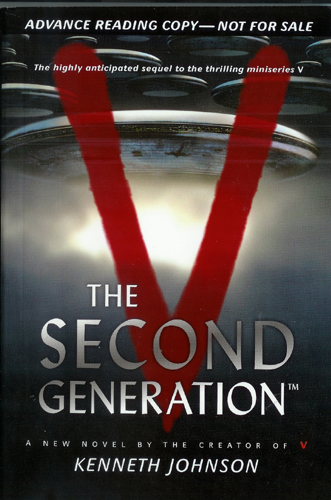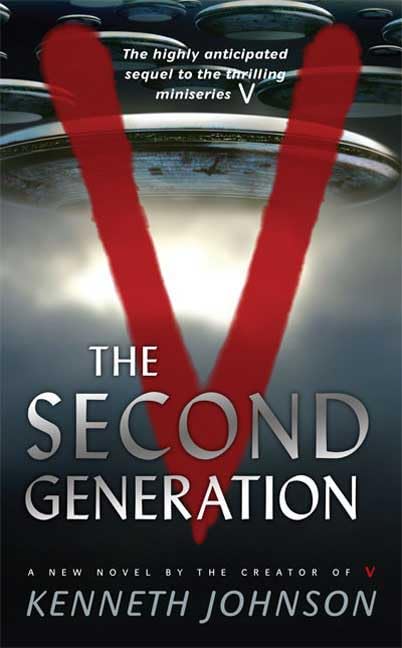
“Our old Earth was a real mess twenty years ago. International conflicts abounded. Just about every country in the world had some sort of internal strife. War and suffering were everywhere and it looked as though things would only get worse and worse. But then suddenly… They arrived.” – from V: The Second Generation
For more than twenty years now human beings have shared their planet with a race from the stars. They have liberated our planet. Saved us from all of its conflicts. They have cured AIDS and most forms of cancer. True, personal freedoms are somewhat limited but that is for our own good, to protect us. And yes the world’s oceans have sunk twenty feet, coastlines extend miles beyond where they used to. But the water was polluted. The Visitors are merely taking the water away to clean it. It will then be returned to us.
In truth the planet has been under the yoke of the Visitor’s for decades. They control everything. Humanity has grown complacent. Many still believe the Visitors are indeed our friends. Everyone serves and least part time as a Visitor Teammate. The wealthy and powerful have learned to be Players to the Visitor power. Those that happen to question why so many people have disappeared themselves disappear. And “scis” i.e.; scientists and their families, those who might glean a deeper understanding of the visitors if left unsupervised, live in ghettos under guard.
So is the state of the world as Kenneth Johnson’s novel, V: The Second Generation begins. Originally written in script form as a sequel to his own groundbreaking 1983-television mini-series “V” Johnson has adapted his screenplay to prose form. In Johnson’s new novel, the science fiction allegory to Nazi Germany the countries they occupied, and the people they dominated is continued.
Like in the original mini-series, we see the state of the world through the eyes some very different familial units. One is a middle class human family that has fully integrated themselves into life under the Visitors. Another is a scientist and his poor family that live in the ghetto intentionally reminiscent of WWII Warsaw. And finally a family made up of a visitor (the fan favorite character “Willie”) his human wife and their half-breed son. Again like the original, the stories of these families begin to intertwine and the characters make new discoveries about themselves and the world they live in throughout the journey. Others are focused on as well. We see familiar characters such as Julie Parish, the matriarch of the human resistance, as well as brand new heroes of the “second generation.” On the Visitor side, Diana continues to reign. But her tenure may be ending as another ambitious Visitor commandant arrives with the news that for the first time since the occupation began, the Visitor Leader is coming to Earth.
We are also introduced to a new alien race, the Zedti. They received the SOS call sent by humanity many years ago and have arrived to help. But they harbor a secret of their own.
Johnson explores the highs and lows of humanity in this novel. He also dwells deeply on the power of propaganda. Having begun life as a screenplay, many scenes are very visual. For example, the Visitor’s employ a beautiful young pop star as one of their mouthpieces. And when the Leader does arrive on Earth, it is in a Triumph of the Will style ceremony of grandiose pomp and circumstance.
I do have some minor criticisms. The reptilian nature of the Visitor’s is public knowledge and while I understand Johnson’s reasoning it did seem somewhat conflicting. Also, too much time is spent dealing with the plight of the human-visitor half-breeds. To me, twenty years does not seem like enough time for an entire race to be born, grow into society, and be universally discriminated against. Johnson explored that concept magnificently with “space immigrants” in Alien Nation but it seems out of place here.
And I have to admit, the “fan boy” in me did wince a bit with Johnson’s use of characters that died in later installments of “V” that he was not involved in. Ultimately I just accepted it and forgot about it but if those “continuity” issues concern you, consider yourselves warned.
This book will definitely engross any fan of the original saga. But those unfamiliar with “V” will also have no trouble enjoying it. The novel’s themes are timeless and just as relevant today as they were twenty, forty, or sixty years ago. Johnson pulls no punches here and thankfully doesn’t need to resort to the constant shock value scenes that many of today’s Hollywood writers used to mask their own lack of talent. We can only hope that some nervous Hollywood executive will stop frantically trying to find something else to remake for five minutes and finally put this into production as the original television movie it should be. But whatever “V’s” live action future holds, this novel is a quality stand-alone piece of work that deserves a place on your shelf.
Now go buy it!
Written by Erik Matthews
